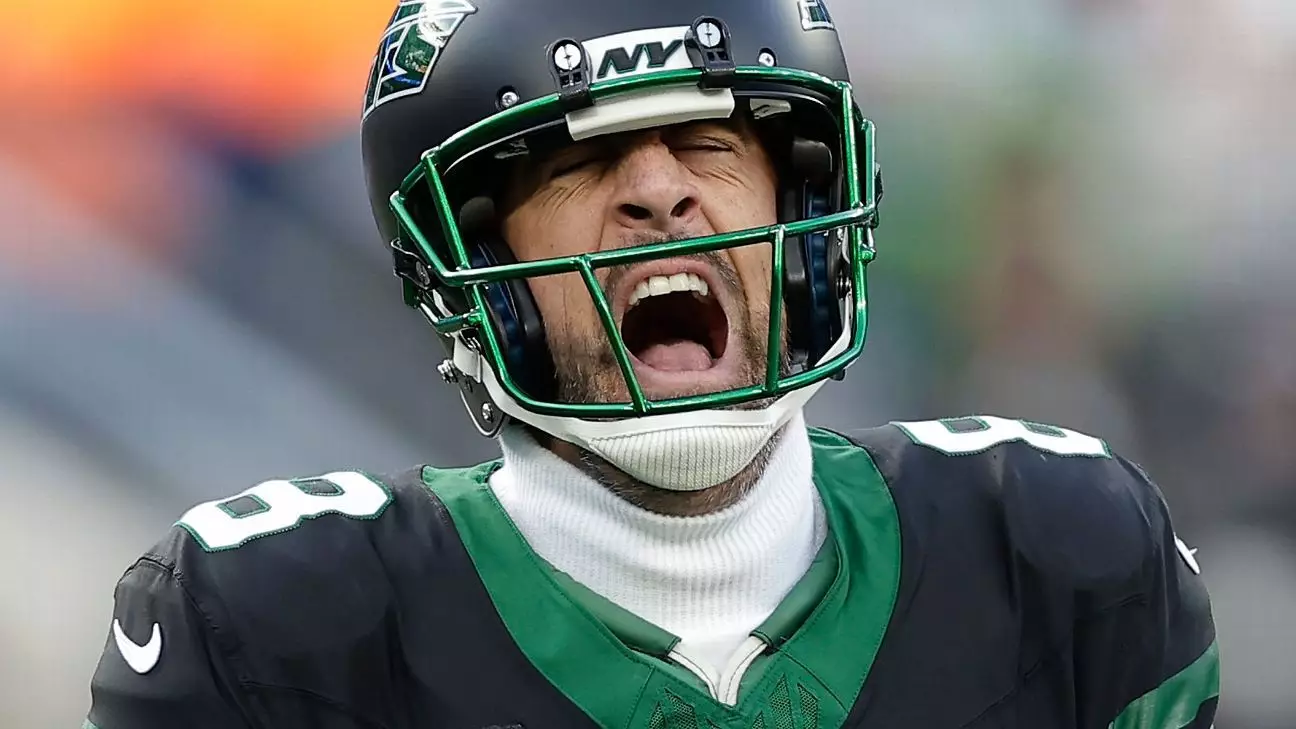The New York Jets’ current plight has become a storm of doubt and disillusionment, particularly as the season draws to a grim conclusion. Amidst the backdrop of an impressive resume and future Hall of Fame prospects, quarterback Aaron Rodgers now finds himself under scrutiny, portraying an unprecedented chapter in his storied career. This season’s performance—which has been riddled with mistakes and missed opportunities—has not only tested his mettle but is also raising troubling questions about his position within the team.
Pinpointing the Frustrations of 2023
The Jets’ recent encounter with the Seattle Seahawks is a microcosm of their broader struggles. The game, culminating in a disappointing 26-21 loss, showcased some of Rodgers’ worst moments on the field, leading many to question whether his experience and accolades still translate to successful performances. A pivotal moment came in the second quarter with a critical interception that shifted the game’s momentum—a pick-six that demonstrated the quarterback’s increasing vulnerability.
Rodgers’ once-coveted arm strength and decision-making have faltered, evidenced by his failure to exceed 200 passing yards for the third consecutive game. This alarming trend is compounded by a lack of rhythm in the offense, which, despite its loaded talent, has struggled to find consistency throughout the season. Interim head coach Jeff Ulbrich’s vague postgame remarks only added fuel to the fire of speculation surrounding Rodgers’ role moving forward. When asked if a quarterback change was in the realm of possibility, his noncommittal response hinted at the unsettling winds of change swirling around the franchise.
The Jets’ coaching situation seems to be mired in internal conflict and lack of direction. Jeff Ulbrich’s cautious approach in addressing Rodgers’ performance raises eyebrows, especially considering that a player of Rodgers’ caliber typically commands a more definitive stance from leadership. This indecisiveness reflects a larger organizational issue—a front office that appeared to have confidence but now seems bereft of plans or cohesive strategies.
Moreover, the comparisons to the tumultuous tenure of former coach Mike McCarthy in Green Bay underscore the cyclical nature of NFL narratives. Rodgers’ struggles evoke memories of past seasons where his form was similarly questioned. As he acknowledged the difficulties, noting that he would be engaged in conversations with Ulbrich if changes were under consideration, there remains a shadow of inevitability around his performance.
The inability to capitalize on advantageous situations persisted against the Seahawks. After holding a 14-0 lead, the Jets witnessed the game slip away through a combination of errors—including eight costly penalties that ultimately crushed any hopes of maintaining control. It is undeniable that Rodgers bore some responsibility, particularly in a critical possession that saw the Jets regress instead of taking advantage of prime field placement.
Rodgers’ admission that “those plays in the second quarter cost us the game,” resonates deeply with an organization that was once on the cusp of a turnaround. The juxtaposition between the Jets’ early lead and ultimate failure paints a portrait of a team in freefall—struggles that have become almost endemic within their identity.
Longer-Term Implications
With the Jets now staring down the barrel of a ninth consecutive losing season, the longer-term implications cannot be overstated. The mounting frustration is reflected in team members’ comments, including cornerback Sauce Gardner’s declaration that the current state is “unacceptable.” The wave of disappointment permeates the locker room, creating an adverse atmosphere that jeopardizes team cohesion and focus.
Rodgers’ candid acknowledgment of needing to improve reflects a player aware of the stakes, but it also begs the question of whether he can genuinely recapture the magic that has thus far eluded him this season. The resonance of his earlier career achievements continues to loom large, yet the current trajectory paints a very different story—one that sees a once-dominant force grappling with decline.
The New York Jets’ season has unraveled, casting a pall over the franchise as it contemplates a tumultuous future. The whispers surrounding Aaron Rodgers’ future with the team amplify an already charged atmosphere and stir conversations around the potential necessity for a shift not just in personnel, but in overall organizational philosophy. The bleak realities of the present must be met with tough decisions as the Jets look to redefine their path forward.

